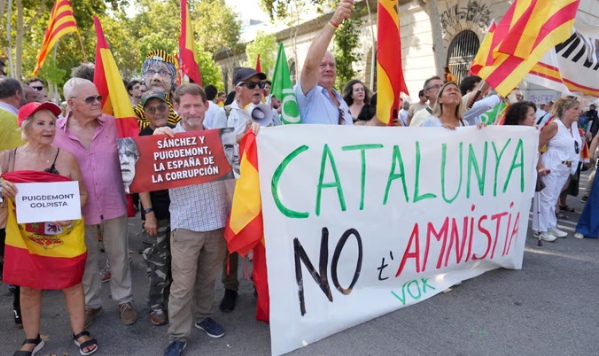Former Catalan president Carles Puigdemont returned to Spain from southern France and in front of some 3,500 separatist supporters gathered in Barcelona on Thursday complained about his “repression,” of which he has been a victim since 2017, despite being freed from the police set up to catch him.
Puigdemont said:
“Today I have come here to remind you that we are still here because we do not have the right to resign (of his pro-independence ideas). For seven years they have been persecuting us for wanting to listen to the voice of the people of Catalonia. Seven years ago they began a harsh repression that has led us to prison and exile, this has affected the lives of thousands and thousands of people, for the fact of being pro-independence, sometimes just for the fact of speaking Catalan, and they have turned the fact of being Catalan into something suspicious.”
Puigdemont, leader of the right-wing separatist party Together for Catalonia (JxCat), much awaited by the Spanish and international media, announced a few days ago his intention to enter the Catalan parliament in Barcelona on Thursday.
The reason is the inauguration of Salvador Illa, leader of the Socialist Party of Catalonia (PSC), as the new president of the regional executive (Generalitat). Puigdemont also claimed:
“Today, many will celebrate my arrest and think that the scorn will deter us, that it is worth breaking even a law passed by your Parliament to make a mockery of me. But they are wrong. And in their mistake they will once again drag down the credibility of Spanish democracy, although we know that this matters very little to them.”
According to the JxCat leader, “it is not, nor was it, nor it will ever be a crime to hold a referendum and obey the mandate of the Parliament of Catalonia,” he stressed referring to the illegal pro-independence referendum of October 1, 2017.
However, according to state broadcaster RTVE, Puigdemont was not a member of the Catalan parliament, and as of 11.00am there was no news that he had been arrested.
Catalan regional police launched a large-scale operation – Operation Jaula (“The Cage”, in Spanish) – across Barcelona in an attempt to arrest the separatist leader.
Although Illa won a snap regional election on May 12, he did not win a sufficient majority to rule alone. He was forced to make concessions, including granting Catalonia greater powers of self-government, in order to win the support of the separatist left-wing Republican Left of Catalonia (ERC) party.
Despite an amnesty law promoted by Spanish Prime Minister Pedro Sánchez (PSOE/S&D) that forgives offences committed by separatist activists between 2011 and 2023, the crime of embezzlement – and personal enrichment in Puigdemont’s case – is not covered by the amnesty.
Puigdemont is still under a Spanish national arrest warrant for that offence. Both JxCat and ERC each have seven legislators in Spain’s national parliament, on whose support Sanchez’s coalition government with the left-wing Sumar platform depends.
Puigdemont fled Spain in 2017, going into self-exile first in Waterloo, near Brussels, until April this year, then he settled in the south of France, from where he crossed the border into Spain.
